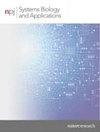SDE系数函数无假设神经推理的损失公式。
IF 3.5
2区 生物学
Q1 MATHEMATICAL & COMPUTATIONAL BIOLOGY
引用次数: 0
摘要
随机微分方程(SDEs)是研究最广泛的概率动力系统之一,被广泛用于复杂生物过程的建模。基于之前介绍的通过神经网络参数化其系数函数来执行动力系统推理的思想,我们提出了一种新的优化目标公式,该优化目标将基于仿真的惩罚与伪似然相结合。与最先进的预测技术相比,这大大提高了预测性能,并使学习各种各样的动力学成为可能,而无需对分析结构进行任何预先假设。本文章由计算机程序翻译,如有差异,请以英文原文为准。
Loss formulations for assumption-free neural inference of SDE coefficient functions.
Stochastic differential equations (SDEs) are one of the most commonly studied probabilistic dynamical systems, and widely used to model complex biological processes. Building upon the previously introduced idea of performing inference of dynamical systems by parametrising their coefficient functions via neural networks, we propose a novel formulation for an optimisation objective that combines simulation-based penalties with pseudo-likelihoods. This greatly improves prediction performance compared to the state-of-the-art, and makes it possible to learn a wide variety of dynamics without any prior assumptions on analytical structure.
求助全文
通过发布文献求助,成功后即可免费获取论文全文。
去求助
来源期刊

NPJ Systems Biology and Applications
Mathematics-Applied Mathematics
CiteScore
5.80
自引率
0.00%
发文量
46
审稿时长
8 weeks
期刊介绍:
npj Systems Biology and Applications is an online Open Access journal dedicated to publishing the premier research that takes a systems-oriented approach. The journal aims to provide a forum for the presentation of articles that help define this nascent field, as well as those that apply the advances to wider fields. We encourage studies that integrate, or aid the integration of, data, analyses and insight from molecules to organisms and broader systems. Important areas of interest include not only fundamental biological systems and drug discovery, but also applications to health, medical practice and implementation, big data, biotechnology, food science, human behaviour, broader biological systems and industrial applications of systems biology.
We encourage all approaches, including network biology, application of control theory to biological systems, computational modelling and analysis, comprehensive and/or high-content measurements, theoretical, analytical and computational studies of system-level properties of biological systems and computational/software/data platforms enabling such studies.
 求助内容:
求助内容: 应助结果提醒方式:
应助结果提醒方式:


